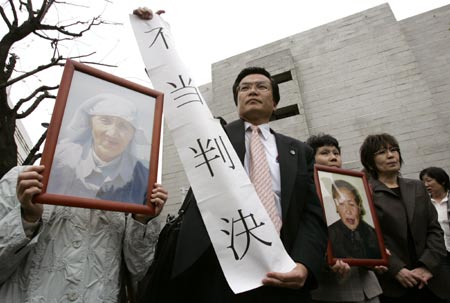Japan courts reject Chinese WWII suits
(Reuters)Updated: 2007-04-27 17:29
The Supreme Court rulings against forced labourers and women forced into sexual servitude will effectively halt a raft of wartime damages cases being fought mainly by Chinese and Koreans, because lower courts look to the top court for guidance.
Two Chinese women who were kidnapped and forced to provide sex for Japanese soldiers during World War Two lost their Supreme Court appeal for damages. That claim had already been settled under a 1972 Japan-China joint statement, the court said.
Their lawyer called on the government nonetheless to provide some form of damages to the surviving of the two women, who is 80 years old.
"I hope that the government admits to the truth and takes specific measures to compensate the victim while she is in good health," said lawyer Sadahiko Sakaguchi.
The issue of sex slaves, known as "comfort women" in Japan, has attracted renewed interest after Abe sparked international outrage in March by denying that the military or the government had forced the women, most of them Asian, into sexual slavery.
Abe has since repeatedly apologised for the suffering of the victims -- most recently in a meeting with U.S. congressional leaders during an official visit to Washington.
In Friday's ruling, the top court acknowledged that the women had been forcibly taken by the Japanese military, then sent to the brothels, contrary to Abe's remarks in March.
LANDMARK RULING OVERTURNED
In another case, five Chinese who were forced to work for Japanese firm Nishimatsu Construction Co. Ltd. during World War Two lost their fight for compensation when the Supreme Court overturned a landmark ruling that had ordered the company to pay them.
That claim had also been settled under the 1972 joint statement, the court said.
"The ruling is disgraceful in light of friendly relations between Japan and China," said Shinzo Tsuchiya, a supporter of the former labourers.
In 2004, the Hiroshima High Court ordered Nishimatsu to pay a total of 27.5 million yen ($230,000) to the plaintiffs.
Nishimatsu had argued that the statute of limitations had expired on violations of obligations to ensure safe working conditions for the workers.
"We have not yet seen the judgment, so we cannot comment in detail," a Nishimatsu official said. "But it is a victory for our company, so from that point of view we think it is an appropriate verdict."
The plaintiffs are among 360 Chinese forcibly brought from China to work in Japan in July 1944. Most of them worked at a Nishimatsu hydroelectric power plant construction site in western Japan until the end of the war in 1945.
Acknowledging that the Chinese labourers had gone through "extremely grave mental and physical sufferings," presiding judge Ryoji Nakagawa suggested that Nishimatsu work to provide relief to the plaintiffs.
Lawyers for the labourers said they planned to meet Nishimatsu executives later in the day.
Dozens of wartime compensation suits have been filed against the Japanese government and companies associated with its aggression in the first half of the 20th century, but almost all have been rejected by Japanese courts.
|
||
|
||
|
|

